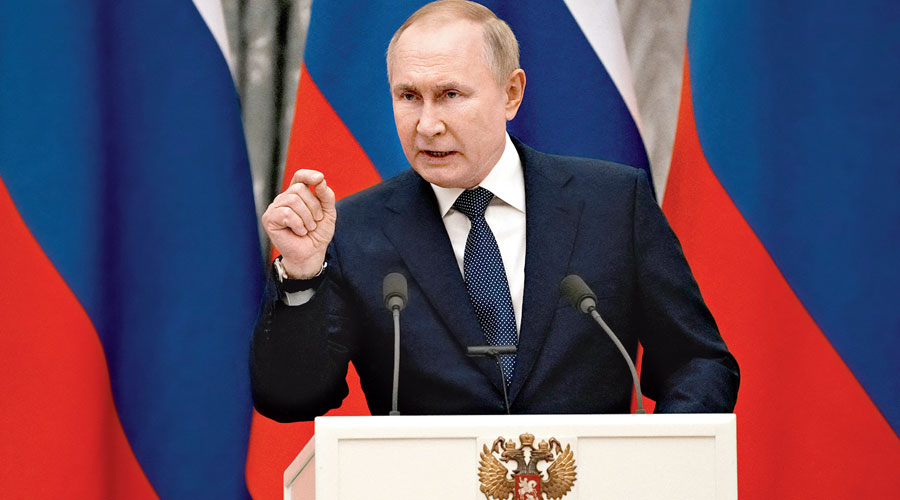Long before Vladimir Putin’s invasion of Ukraine and the mass detentions of Russian peace protesters, the Kremlin was already stifling dissent - with choking bureaucracy.
Throughout 2021, the Kremlin tightened the screws on its opponents – including supporters of jailed opposition leader Alexei Navalny – using a combination of arrests, internet censorship and blacklists. The crackdown accelerated after Russia invaded Ukraine. Now a Reuters data analysis and interviews with dozens of people chart these tactics’ success in eroding civil freedoms.
A widely used weapon in the Kremlin’s armoury is the state’s register of “foreign agents.” People whose names appear on this official list are closely monitored by the authorities. Among them is Galina Arapova, a lawyer who heads the non-profit Mass Media Defence Centre, which advocates for freedom of expression and is based in Voronezh, western Russia.
The Ministry of Justice declared Arapova, 49, a “foreign agent” on Oct. 8. She wasn’t told why. The ministry didn’t comment for this article.
The designation brings close government scrutiny of Arapova’s daily life and a mountain of red tape. She must file a quarterly report to the Ministry of Justice detailing her income and expenses, including trips to the supermarket. The report runs to 44 pages. Reuters reviewed one such report.
Every six months, “foreign agents” must file an account to the ministry of how they spend their time. Some retired people list their household chores. Arapova states in her account simply that she works as a lawyer, unsure whether she’s providing enough detail.
She offers legal advice to other “foreign agents,” but says she’s often in the dark about what the rules require. “We don’t fully understand what exactly they want us to do because the law is very vague,” she told Reuters. “They don’t explain anything. Do we have to list all utility costs and receipts from supermarkets or just overall expenses for three months?”
She prints out then mails the report to the ministry, the pages carefully stapled together. If a page is missing or the report arrives late, she could be fined. Repeated violations can lead to prosecution and up to two years in jail.
Reuters sent detailed questions to the Kremlin, the Ministry of Justice and other Russian agencies about the rules imposed on “foreign agents.” None provided any comment.
The bureaucracy doesn’t end there.
People deemed to be “foreign agents” must set up a legal entity, such as a Limited Liability Company. This too is added to the list of “foreign agents” and must report its activities to the authorities. The process involves finding premises to register a legal entity, drawing up seals and electronic signatures, submitting documents to the tax service, and opening a company bank account. The company has to undergo annual audits but, as Arapova explains, auditors are not keen on taking clients with “foreign agent” status, and those who do tend to charge a lot.
She estimates that complying with the requirements so far has cost her about 1,000 euros. Accounting fees will add to that sum when her LLC undergoes an audit. Even more costly is the endless time spent on meeting the requirements.
“It takes time away from my work and causes a lot of psychological stress,” she said. “When you’re forced to do this type of bureaucratic and humiliating nonsense it’s a kind of psychological torture.”
And that, some analysts say, is the Kremlin’s aim. These registers, said Ben Noble, associate professor of Russian politics at University College London, are “part of a broader project, which involves both moving against individuals who are publicly critical of the government and also trying to have a broader chilling effect to stop people from even thinking about getting involved with opposition or critical, independent journalism in the first place, for fear that they will, essentially, be framed by the authorities as traitors.”
“The repression we’re seeing now,” since the war broke out, “is a spectacular escalation of trends already in evidence over the last few years,” Noble said.
Reuters contacted all 76 people on the list of “foreign agents,” which is compiled by the Ministry of Justice and published on its website. Sixty five responded to a series of questions about how the designation affected them, creating a unique dataset. These people include journalists, pensioners, activists and performers. All are Kremlin critics.
The respondents, all Russian citizens, denied working for a foreign power. Most said they had received no explanation for their inclusion on the list. Several lost work or were forced to change jobs. Others said they left Russia because they didn’t feel safe. Dozens said they reduced their social media activity because everything they publish, even personal social media posts, must contain a 24-word disclaimer that identifies them as a “foreign agent.” Since the invasion of Ukraine, at least five people on the register said they have been briefly detained for involvement in anti-war protests or while carrying out reporting related to the war. At least one further detention was reported locally.
Many critics accuse Putin of bringing back Soviet-era style repression. The Kremlin says it is enforcing laws to thwart extremism and shield the country from what it describes as malign foreign influence. When it comes to Ukraine, Putin says he is carrying out a “special operation” that is not designed to occupy territory but to destroy its southern neighbour’s military capabilities, “denazify” it and prevent genocide against Russian-speakers, especially in the east of the country. Ukraine and its Western allies call that a baseless pretext for a war to conquer a country of 44 million people.










